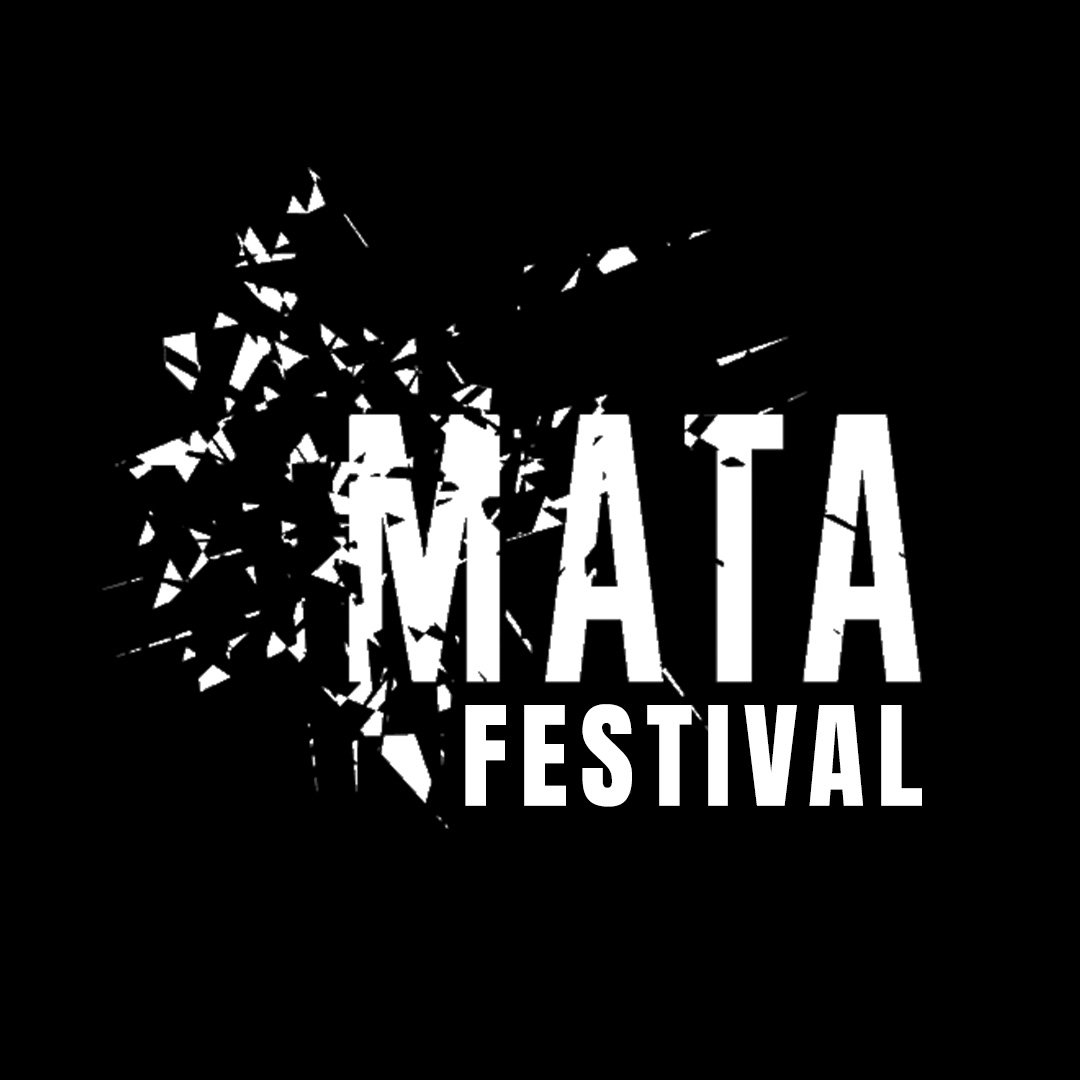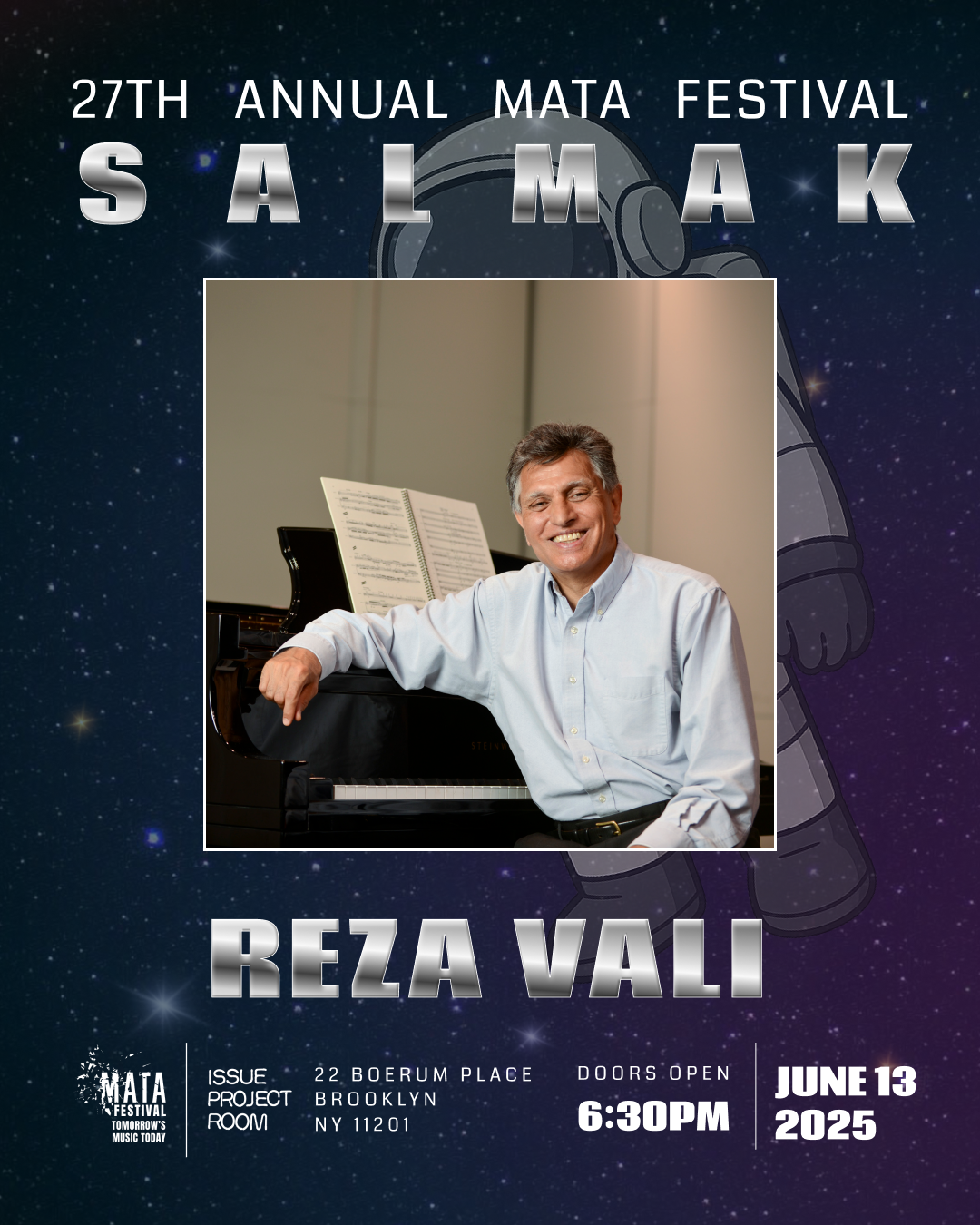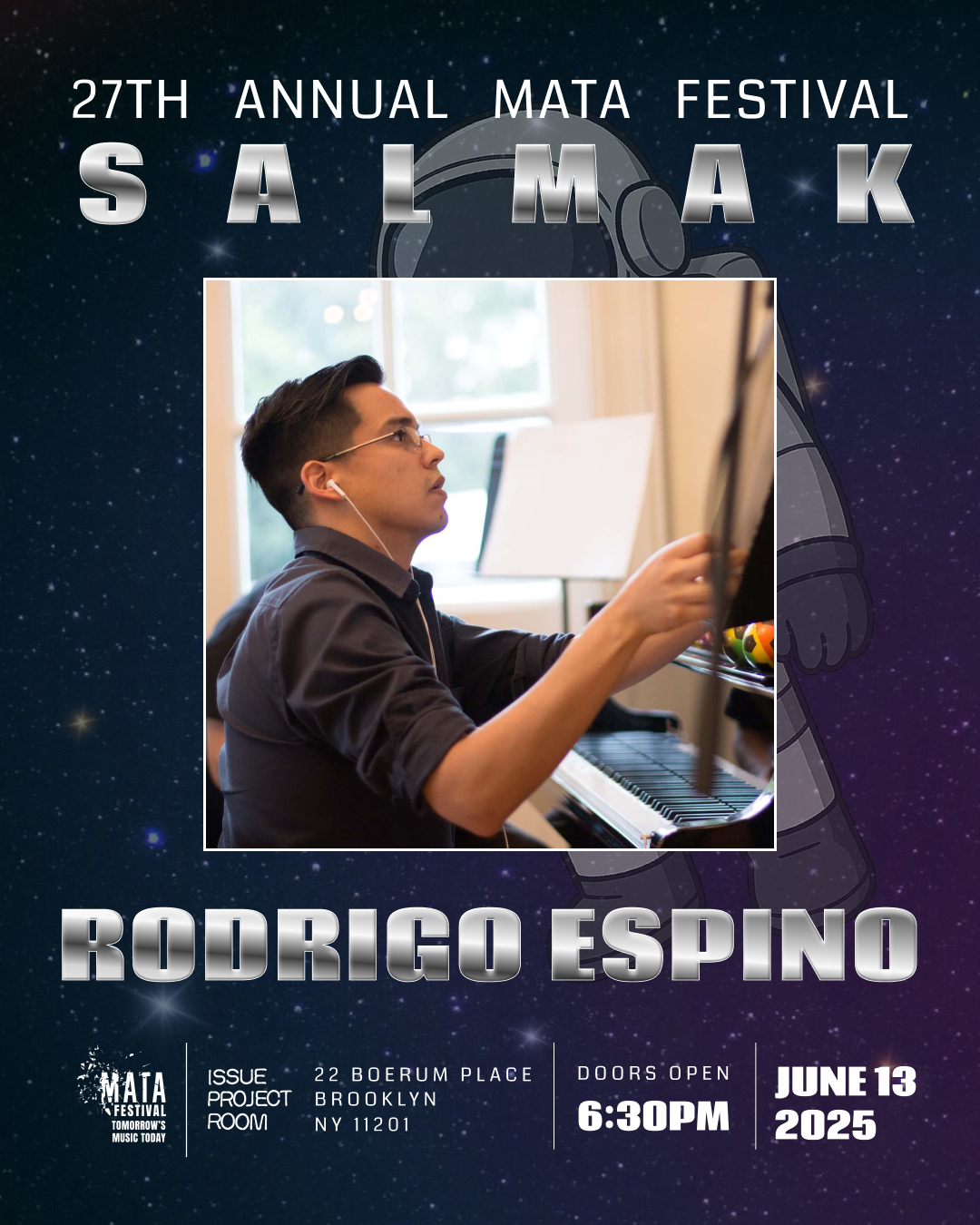Annual MATA Festival
In partnership with ISSUE Project Room
NIGHT THREE: SALMAK
Night Three of the 27th Annual MATA Festival is centered around the world premiere of Reza Vali’s String Quartet No. 6, Salmak, a tribute to the great 13th century Persian music theorist and musician Safialdin Ormavi.
Vali says of the work, “I have used some of Ormavi’s 13th century medieval modes and have interpolated these modes with some of the modes of the modern Persian modal system, the Dastgâh system.”
The evening also includes four pieces by 2025 MATA Festival Early-Career Composers, each exploring varying heightened emotional states – surviving survival instincts; pain and lamentation; catharsis after the pandemic; and the struggle to release unresolved emotions – performed by FLUX Quartet and the MATA Mavens.
Performing ARTISTS and ENSEMBLES
FLUX Quartet
The FLUX Quartet is a New York-based string ensemble founded in the late 1990s by violinist Tom Chiu, inspired by the experimental ethos of the Fluxus art movement. Renowned for their fearless approach to contemporary classical music, the quartet has premiered over 100 works by leading avant-garde composers such as Alvin Lucier, Wadada Leo Smith, Oliver Lake, and Julio Estrada. They are particularly acclaimed for their definitive performances and recordings of Morton Feldman’s string quartets, including the monumental six-hour String Quartet No. 2 .
FLUX has performed at prestigious venues like Carnegie’s Zankel Hall, the Kennedy Center, and international festivals across Europe, Australia, and the Americas. Their collaborations span diverse disciplines, including projects with choreographers Pam Tanowitz and Shen Wei, experimental balloonist Judy Dunaway, and digital art ensemble OpenEnded Group. They also appeared in Matthew Barney’s film River of Fundament .
Committed to nurturing emerging talent, FLUX has held residencies at institutions such as Wesleyan, Princeton, and Dartmouth, and has received support from organizations like the American Composers Forum and the Aaron Copland Fund .
Their discography includes releases on labels like Mode Records, Cantaloupe, Tzadik, and Cold Blue Music, solidifying their status as a leading force in contemporary string quartet performance.
MATA MAVENS
Tyler J. Borden
Tyler J. Borden is a Brooklyn-based cellist, improviser, and composer known for his adventurous approach to contemporary and experimental music. Originally from Rochester, NY, he studied at Ithaca College and SUNY Buffalo under Elizabeth Simkin and Jonathan Golove, and is currently pursuing a DMA at UC San Diego with Charles Curtis.
Borden is a core member of the [Switch~ Ensemble], dedicated to electroacoustic music, and has performed with groups like the JACK Quartet, Mivos Quartet, and Ghost Ensemble. He has collaborated with composers such as Alvin Lucier, La Monte Young, and Brian Ferneyhough, and performed at festivals including June in Buffalo, Darmstadt, and the Lucerne Festival.
An active improviser, Borden co-founded High Desert Soundings, an experimental music festival in Joshua Tree, CA. His solo work explores the physical and sonic limits of the cello, as showcased in his albums PROOF and Mayfly. In 2024, he received the inaugural New Music Performance Grant at Brown University.
Katie Porter
Katie Porter is a clarinetist, performer/composer, writer, and artist. Her work is rooted in decades of experimental and community performance practices, where she explores how music can exist almost like landscapes or relationships, slowly altering our ability to perceive change, time, and space. Devoted to collaboration, Katie performs as Phase to Phase(with Lucio Capece), Eternities (with Bob Bellerue), MUD (with Anne Penders), MOONS (with Christine Tavolacci, Laura Cetilia, and Judith Berkson), among many other solo projects. Katie is recording a multi-year project for solo clarinet in Nancy Holt's land artwork, Sun Tunnels, in the remote Utah desert, her writings are published in Sound American, and her recent creative work can be heard in Brooklyn’s ISSUE Project Room archive, where she was 2024 Artist-in-Residence. www.fromkp.com
Featured COMPOSERS
Reza Vali
Reza Vali was born in Ghazvin, Iran, in 1952. He began his music studies at the Conservatory of Music in Tehran. In 1972 he went to Austria and studied music education and composition at the Academy of Music in Vienna. After graduating from the Academy of Music, he moved to the United States and continued his studies at the University of Pittsburgh, receiving his Ph.D. in music theory and composition in 1985. Mr. Vali has been a faculty member of the School of Music at Carnegie Mellon University since 1988. He has received numerous honors and commissions, including the honor prize of the Austrian Ministry of Arts and Sciences, two Andrew W. Mellon Fellowships, commissions from the Pittsburgh Symphony Orchestra, the Boston Modern Orchestra Project, the Pittsburgh New Music Ensemble, Kronos Quartet, the Carpe Diem String Quartet, the Seattle Chamber Players, and the Arizona Friends of Chamber Music, as well as grants from the Pennsylvania Council on the Arts, The Pittsburgh Foundation, and the Pittsburgh Board of Public Education. He was selected by the Pittsburgh Cultural Trust as the Outstanding Emerging Artist for which he received the Creative Achievement Award. Vali's orchestral compositions have been performed in the United States by the Pittsburgh Symphony, the Seattle Symphony, the Boston Modern Orchestra Project, the Baltimore Symphony, the Memphis Symphony Orchestra, and Orchestra 2001. His chamber works have received performances by Cuarteto Latinoamericano, the Pittsburgh New Music Ensemble, the Carpe Diem String Quartet, Kronos Quartet, the Seattle Chamber Players, and the Da Capo Chamber Players. His music has been performed in Europe, China, Chile, Mexico, Hong Kong, and Australia and is recorded on the Deutsche Gramophone, Naxos, New Albion, MMC, Ambassador, Albany, and ABC Classics labels.
Program Note “Salmak (String Quartet No. 6)“
Salmak (String Quartet No. 6) is a tribute to the renowned 13th-century Persian music theorist and composer Safi al-Din Ormavi, a key figure in the development of medieval Persian music theory.
The work is structured in six short, interrelated movements. Drawing inspiration from Ormavi’s modal system, Vali weaves together modes from the 13th-century Maqam tradition with those of the contemporary Persian Dastgâh system. The odd-numbered movements (I, III, V) are based on the modern Dastgâh modes, while the even-numbered movements (II, IV, VI) reflect the ancient Maqam modes.
By bridging centuries of Persian musical heritage, Salmak offers a rich dialogue between tradition and modernity, evoking the timeless spirit of Ormavi’s legacy.
Early-Career COMPOSERS
Petra Strahovnik
Petra Strahovnik is an internationally acclaimed composer and interdisciplinary artist, celebrated for her fearless exploration of sound and music. Her groundbreaking works blend music, performance, and visual art, drawing inspiration from societal issues and human experiences. The piece Prana, for symphony orchestra, won her the 66th International Rostrum of Composers Prize, organized by the International Music Council. In an Art Residency with Ensemble Modelo62, Petra created disOrders, a series of works combining music and performance art to challenge perceptions of mental health. Her achievements also include a Fellowship and Art Residency at Villa Concordia in Bamberg, granted by the Bavarian State Ministry of Science and the Arts, and the Berlin Art Prize for Music 2021, awarded by the Akademie der Künste.
Petra has collaborated with leading musicians and ensembles, including Rei Nakamura, Saskia Lankhoorn, Ensemble Modern, Neue Vocalsolisten Stuttgart, Slagwerk Den Haag, and the RTV Slovenia Symphony Orchestra. Her works have been performed on podiums and festivals such as Ultraschall Berlin, Muziekgebouw, Slovenian Philharmonic, Music Biennale Zagreb, International Ankara Music Festival, LSO St Luke London, Musikprotokoll and ECCO Festival.
In 2013, her opera Becoming the System premiered to critical acclaim. The disOrders project, supported by Fonds Podiumkunsten, led to the opera BallerinaBallerina, inspired by Marko Sosič’s novel, which premiered in The Hague in 2022. Her first audio-video release, Amaranthine, composed for pianist Saskia Lankhoorn, was recorded at Villa Concordia in Bamberg, featuring an immersive binaural format.
Through her visionary approach, Petra Strahovnik continues to push the boundaries of contemporary music, creating immersive and thought-provoking works that challenge artistic norms.
Program Note “Attack“
Humans evolved to react to perceived harm, attack, or threats to survival with the fight-or flight response—an instinctive mechanism designed for protection. While often beneficial, this response becomes problematic when faced with inescapable or prolonged trauma, such as war, disease, or chronic stress. The brain and autonomic nervous system attempt to shield us, yet sometimes this so-called protection turns against us, manifesting as psychological and physical distress.
Attack explores this precarious state—where survival instincts, once advantageous, become relentless cycles of fear, tension, and misfiring signals. The piece delves into the turbulence of an overburdened nervous system, shifting between moments of raw intensity and eerie stillness, mirroring the body’s struggle to regain balance.
Prolonged exposure to stress and repeated assaults on the body and mind alter perception and reality over time. Trauma is not only psychological but also physical, embedding itself into the body's systems. The autonomic nervous system remains trapped in a heightened state, where suffering becomes normalized, and the distinction between defense and harm blurs.
Rather than seeking resolution, Attack expresses the relentless tension between survival and collapse, capturing the raw and unfiltered experience of an internal war.
Anuj Bhutani
Described as “a force multiplier with more talents than time” (PATRON Magazine), “with a special gift for taking the personal and making it universal” (Beth Morrison, Opera Wire), Anuj Bhutani is a quickly emerging composer, performer, vocalist, and producer whose “alternately celestial and dark” music (John Schaefer, WNYC New Sounds) often features visceral grooves; ethereal, meditative spaces; a combination of acoustic instruments and electronics, narrative depth, and genre-fluidity. His work has been presented by Beth Morrison Projects and LA Performance Practice at venues including National Sawdust and the Banff Centre. He’s won an ASCAP Morton Gould Young Composer Award, Chamber Music America Classical Commissioning Grant and taken part in American Composer’s Orchestra’s Earshot, NewAm Composer’s Lab and residencies at Loghaven, Avaloch Farm Music Institute and Atlantic Center for the Arts, among others. His work has been commissioned or performed by Ashley Bathgate, Raleigh Civic Symphony, Metropolis Ensemble, Verdant Vibes, Switch~ ensemble, the William Paterson University Percussion Ensemble, and more.
He earned his master’s degree at University of Southern California where he was awarded Outstanding Graduate in Composition and his bachelor’s degree at University of North Texas.
Program Note “On Letting Go“
Written mostly over the course of 2020 during the height of the COVID-19 pandemic, "On Letting Go" was the piece that helped me keep any degree of sanity during that time. I am immensely grateful to Ashley Bathgate for collaborating with me on it, and for being so willing to experiment, offering her insight, and generous with her time and talent. Through this piece, I hoped to work through my own emotions during that difficult time, and to feel some kind of catharsis when it seemed like most of us were stuck in a perpetual state of turmoil. If you hear this piece, I hope you are also provided a chance to let go of whatever it is you need to let go of in this moment.
Rodrigo Espino
He studied for a bachelor’s degree incomposition at the Faculty of Music ofthe National Autonomous University ofMexico (U.N.A.M.), graduating withHonors and receiving the "GabinoBarreda" University Merit Medal. He studied composition privately with GermánRomero (2013–2018) and Samuel Cedillo (2016–2022).
His music is a visceral experience, produced and perceived through the entire body.He approaches sound as the result of complex physical actions and forces thatcollide within the instrument and the performer’s body. The driving force behind hismusic emerges from the experience of epilepsy and physical pain, exploring thebody’s inability to voice itself as a catalyst for transforming convulsion into creativeenergy.
He was awarded the Jóvenes Creadores 2022–23 scholarship by the ArtisticCreation Support System (formerly FONCA) and has been a recipient of theStrengthening Program for Young Composers on two occasions (CMMAS 2017 andCepromusic 2020).
His music has been performed by ensembles and musicians such as EnsambleCEPROMUSIC, experimental percussionist Ángel Florido, David Moliner, TambucoPercussion Ensemble, and the Low Frequency Trio, among others. His works havebeen presented at Mexico's most important venues, such as the Palacio Nacionalde Bellas Artes, as well as in Brazil and Switzerland.
Program Note “Responso en el vacío (2022-23)”
Rodrigo Espinofor contrabass clarinet. (aprox. 12- 13 mins.)This work is part of a collection of pieces centered around tearing, physical pain, and theimpossibility of speech — in other words, making audible a wailing expression that collideswith external forces. The friction generated between sonic materials — which physicallyoppose each other through the contrast of extremely soft dynamics in a compressed highregister and the performer’s physical parameters — results in an unstable, tense, stammering-like sound that defines both the expressive and formal structure of the piece.
This choked lament intensifies as the body remains trapped in the conditions that torment it,foaming violently in abrupt bursts of energy that stretch the register and push the performerto the limits of physical strain. Hyperventilating, playing forcefully and desperately, theperformer eventually collapses into a fragile response that dissipates into the void.
And what you now call tomorrow and
soon and next year and after that—
becomes an open wound, full of pus.
It festers and never drains.
The prisoner II, Rainer M. Rilke
Negar Soleymanifar
Negar Soleymanifar is an Iranian composer and performer currently based in Middletown, CT,United States. She centers her work on an interpersonal perspective and its relationship to otherhuman beings, exploring psychological states, inner struggles, and social contexts through hermusic, with the aim of communicating what seems uncommunicable.
She holds a bachelor'sdegree in music composition from the Tehran University of Art and is pursuing an MA in musicwith a concentration in experimental music and composition at Wesleyan University. Her thesisproject explores the soundscape of her city, investigating sound in relation to memory,perception, and multiplicity.
Program Notes “Prelude to the Ashes“
Prelude to the Ashes is based on a part of a story I wrote, drawn from a deeply personal momentof transition. The piece is approximately 11 minutes and 20 seconds long. I originally composedit for solo double bass in the fall of 2023 and later added a reciter part—reading the section ofthe story that the piece is based on—for its first performance in the summer of 2023.
At its core,the piece is a meditation on change, the weight of the past, and the struggle with unresolvedmemories. This tension was present in my life at the time of writing, as I experienced leavinghome and stepping into an unfamiliar world—carrying both distance and attachment. Throughthis performance, I sought to express the complexities of that moment: the echoes of sorrow, thestruggle to let go, and the pain of unresolved emotions.









